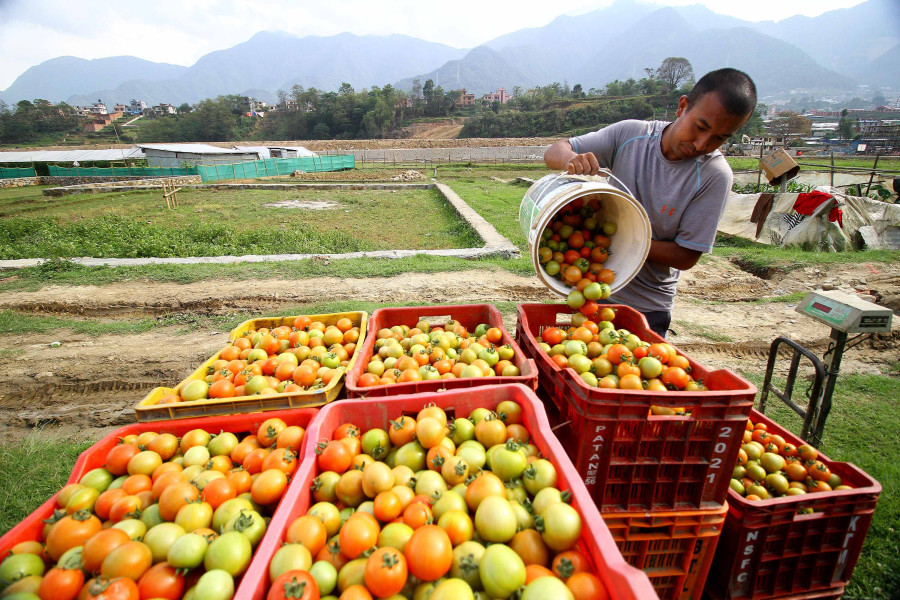Money
Farmers face getting wiped out for lack of market access
Vegetable growers are forced to destroy their products because there is no transportation to get them to buyers.
Krishana Prasain
After the lockdown was stretched and made stricter from last Friday, vegetable farmer Sujan Kumar Shrestha faces getting wiped out because he can't get his produce to market.
“I used to sell leafy green vegetables and coriander worth Rs10,000 daily before the lockdown. But on Monday alone, I had to destroy 250 kg of vegetables because there was no transportation,” said former migrant worker Shrestha who has been growing vegetables commercially in Ramkot since returning from Dubai eight years ago.
Last year too, Shrestha had to dump 5,000 kg of cabbage during the lockdown. Currently, he has been throwing away 200 kg of vegetables daily.
During this season in the past, Shrestha would be dispatching 500 kg of vegetables daily to the Kalimati Fruits and Vegetable Market and the Balkhu Agriculture Commodity Market.
“I am incurring heavy losses, but I keep getting reminders when it's time to make tax or loan payments even though there is no environment to generate income," he said.
His fields are filled with pumpkin, zucchini, broccoli, cauliflower, cabbage, tomato, leafy green vegetable and coriander ready to be harvested; but with no access to market, his vegetable crop lies untended.
“Problems in selling vegetables started right after the lockdown was imposed in Kathmandu Valley a month ago. But the recent order shutting down groceries, department stores, home delivery and street vendors, and permitting vegetable shops to open only till 9 am dealt a death blow to the business,” he said.
The market disappeared after the lockdown was tightened, he said. "It is fine to clamp a strict lockdown to prevent the virus from spreading; but the distribution of vegetables needs to be eased as delays lead to losses, and consumers also suffer from high prices and shortages."
Mush Farm of Balambu, which makes mushroom seeds, closed down soon after the lockdown was announced.
“I used to supply 10,000 kg of mushroom seeds monthly to commercial farmers in many parts of the country. But I stopped production due to transportation problems," said owner Suraj Maharjan. Mushroom seeds cost Rs150 per kg.
It has been a month since the government imposed a second lockdown in the valley, and similar stay-home orders are being issued in almost all districts in the country.
The lockdown has disrupted the supply chain with small windows allowed for transporting vegetables, livestock and dairy products. Consumption has also declined with the closure of retail shops and only a few stores being allowed to open.
The limited supply of vegetables due to the lockdown has meant that consumers are also being forced to pay more.
Balaram Ghimire, who bought tomato for Rs50 per kg last Thursday, said he paid Rs80 per kg on Sunday. “Farmers are leaving their crops on the fields, and here we not only have to pay high prices but vegetables are hard to find these days,” said the Thankot resident.
Shrestha said that he was facing problems supplying 200 broiler chickens out of a total 1,000 birds that are ready for market.
The vegetable seedlings that were ordered for terrace farming have started getting older because there is no way to supply them, he said.
Dairy producers too are stressed. Following the lockdown, commercial dairy farmer Pradeep Raj Panta has not been able to ship his products to market. "Milk transporting vehicles have been ordered off the streets from Friday," he said.
“Dairy producers are not making payment on time saying that they have excess milk,” said Panta who rears 80 cows and produces 400 litres of milk daily on his farm in Changu Narayan. “The disruption to the supply chain has raised questions about surviving in the business,” Panta said.
The Nepal Dairy Association said that the consumption of milk and dairy-related products had fallen even further with most retail distributors remaining closed after the lockdown was extended by a week from May 28.




 27.41°C Kathmandu
27.41°C Kathmandu















